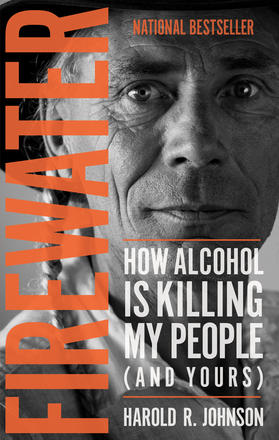
Firewater
How Alcohol Is Killing My People (and Yours)
Awards
- Short-listed, Governor General's Award for Non-Fiction 2016
Description
A passionate call to action, Firewater examines alcohol—its history, the myths surrounding it, and its devastating impact on Indigenous people.
Drawing on his years of experience as a Crown Prosecutor in Treaty 6 territory, Harold Johnson challenges readers to change the story we tell ourselves about the drink that goes by many names—booze, hooch, spirits, sauce, and the evocative “firewater. ” Confronting the harmful stereotype of the “lazy, drunken Indian,” and rejecting medical, social, and psychological explanations of the roots of alcoholism, Johnson cries out for solutions, not diagnoses, and shows how alcohol continues to kill so many. Provocative, irreverent, and keenly aware of the power of stories, Firewater calls for people to make decisions about their communities and their lives on their own terms.
Reviews
"[T]his Crown prosecutor, author, and former miner and logger, who has prematurely buried too many friends and relatives due to alcohol-related deaths, refuses to back away from the difficult challenge of addressing the root causes of alcoholism in First Nations communities. He convincingly argues that reality and all of its constituent elements--borders, corporations, governments, race--are ultimately defined by stories, and that an intentional effort to change the tales First Nations people tell about themselves would clear a path forward where addiction treatment and law enforcement models have failed. .. Written in the style of a kitchen-table conversation, Johnson's personal anecdotes and perceptive analysis are a call to return to a traditional culture of sobriety. " -- Publishers Weekly
"This is an extraordinary memoir by a Cree writer who understands the damage alcohol does when used to kill the pain caused by white Canadians stealing and torturing Indigenous children throughout this nation's history. I know many white alcoholics but it's always 'the drunk Indian. ' Why? Firewater is a great book; it burns in the hand. " - Heather Mallick, Toronto Star
"Johnson lays out an alternative narrative from that of the 'lazy, drunken Indian' in order to clear the way to a different conclusion and find and fashion a home-grown fix to a problem that threatens to destroy Indigenous communities. Johnson's suggestions for necessary ways of healing are welcome and tragically overdue. And his suggestion for an alternative narrative is not one of hopelessness. The book should be a bible in the fight for survival and recovery, for a better life for coming generations, and it should somehow be made available to band councils and urban community and friendship centres. " - Morgan O'Neil, First Nations Drum